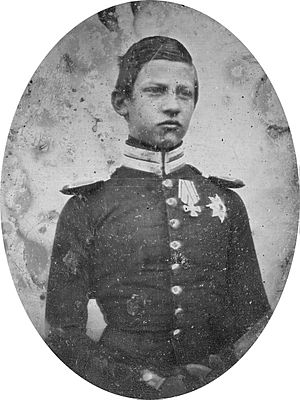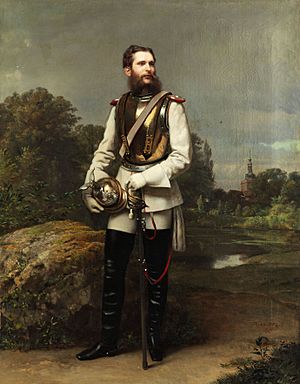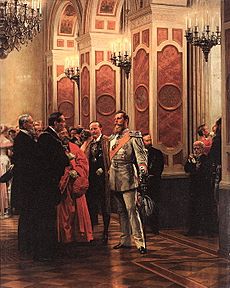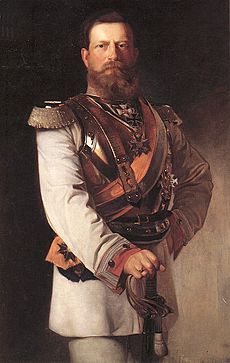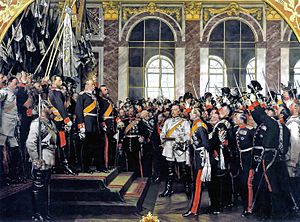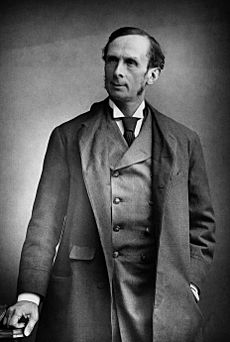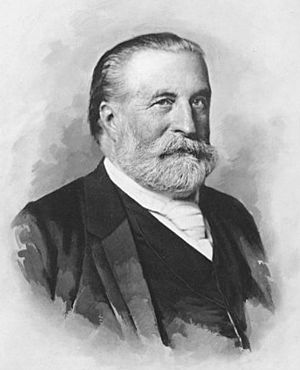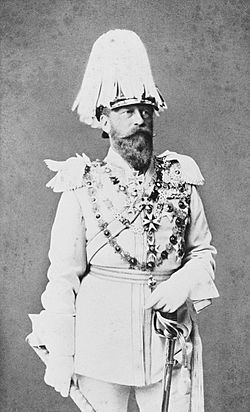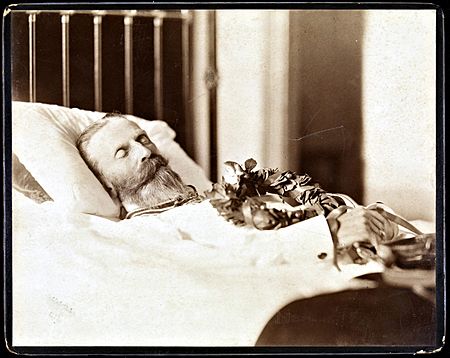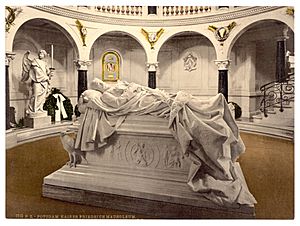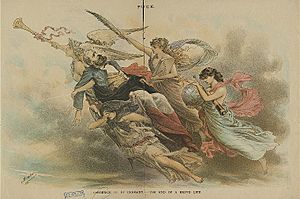Frederick III, German Emperor facts for kids
Quick facts for kids Frederick III |
|
|---|---|
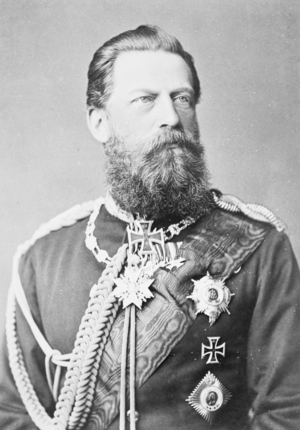
Frederick as Crown Prince, c. 1878
|
|
| German Emperor King of Prussia |
|
| Reign | 9 March 1888 – 15 June 1888 |
| Predecessor | Wilhelm I |
| Successor | Wilhelm II |
| Chancellor | Otto von Bismarck |
| Born | Prince Frederick William of Prussia 18 October 1831 New Palace, Potsdam, Kingdom of Prussia |
| Died | 15 June 1888 (aged 56) New Palace, Potsdam, Prussia, German Empire |
| Burial | 18 June 1888 Friedenskirche, and then in a mausoleum attached to the church, Potsdam |
| Spouse | |
| Issue |
|
| House | Hohenzollern |
| Father | William I, German Emperor |
| Mother | Princess Augusta of Saxe-Weimar-Eisenach |
| Religion | Lutheranism (Prussian United) |
| Signature | |
Frederick III (born Friedrich Wilhelm Nikolaus Karl; October 18, 1831 – June 15, 1888) was the German Emperor and King of Prussia for a very short time in 1888. He reigned for only 99 days, during what is known as the "Year of the Three Emperors."
Frederick was the only son of Emperor Wilhelm I. He grew up in a family that valued military service. As a young man, he was known for his leadership in several wars, including the Second Schleswig War, Austro-Prussian War, and Franco-Prussian War. However, he actually disliked war and was praised for being kind and humane, even to his enemies.
In 1871, Germany became a unified empire. His father, who was already King of Prussia, became the first German Emperor. Frederick became Crown Prince, meaning he was next in line for the throne. He held this title for many years. When his father died in March 1888, Frederick became Emperor.
Sadly, Frederick was suffering from cancer of the larynx (throat cancer) when he became emperor. He died at age 56, just 99 days after taking the throne.
Frederick married Victoria, Princess Royal, who was the oldest child of Queen Victoria of the United Kingdom. They were a good match and shared similar ideas about how the government should work. They both believed in liberalism, which meant they wanted ordinary people to have more say in the government. Even though Frederick came from a military family, he developed liberal views because of his connections to Britain and his studies at the University of Bonn.
As Crown Prince, Frederick often disagreed with the powerful German chancellor, Otto von Bismarck. Bismarck believed in uniting Germany through force, but Frederick wanted a more peaceful approach. He also thought the chancellor's power should be limited. Many people in Germany and Britain hoped that Frederick would make the German Empire more liberal when he became emperor.
Frederick and Victoria admired Prince Albert, Queen Victoria's husband. They planned to rule together, like Victoria's parents, and change some parts of the government that Bismarck had created. They wanted to replace the chancellor's office with a system like Britain's, where ministers were responsible to the parliament (the Reichstag).
However, Frederick's illness stopped him from making these big changes. The few changes he did make were later undone by his son, Wilhelm II. Historians often wonder what might have happened if Frederick had lived longer. Many believe his early death was a turning point in German history, and that he might have made the Empire more liberal.
Contents
Life and Education
Growing Up in Prussia
Frederick William was born on October 18, 1831, in the New Palace in Potsdam, Prussia. He belonged to the House of Hohenzollern, the ruling family of Prussia. At the time, Prussia was the strongest German state.
Frederick's father, Prince William, was a strict military man. His mother, Princess Augusta of Saxe-Weimar, came from a more artistic and intellectual background. She was known for her liberal ideas. Because his parents had very different personalities, Frederick grew up in a somewhat difficult home. He had a sister, Louise, who was seven years younger and very close to him.
A Time of Change
Frederick grew up during a time when new ideas were spreading in Germany. People wanted more freedom and a unified Germany. They wanted a constitutional monarchy, which meant a king or queen would rule, but their power would be limited by a constitution. This constitution would protect people's rights.
When Frederick was 17, these ideas led to uprisings across Europe. People wanted freedoms like the right to gather and a free press. Even though these uprisings didn't bring big changes right away, liberal ideas stayed important in German politics throughout Frederick's life.
Schooling and New Ideas
Even though his family valued military training, Frederick's mother insisted he also get a classical education. So, Frederick learned about both military traditions and subjects like history and languages. He was a talented student, especially good at English and French. He also studied history, geography, physics, music, and religion.
At age 10, he became a second lieutenant in the army. But when he was 18, he did something unusual for a Prussian prince: he went to the University of Bonn. There, he studied history, law, and public policy. His time at the university and the influence of his more liberal family members helped him develop his own liberal beliefs.
In 1853, Frederick joined Freemasonry, a social and charitable organization, like his father. Later, he became a leader of the German Freemasons.
Marriage and Family Life
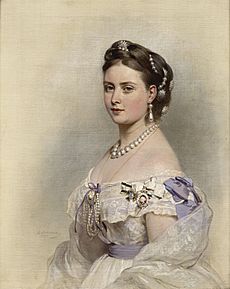
In the 1800s, royal marriages were often arranged to create alliances between countries. In 1851, Queen Victoria of the United Kingdom and her husband, Prince Albert, planned for their oldest daughter, Victoria, Princess Royal, to marry Frederick. They wanted to keep their family ties to Germany strong. Prince Albert also hoped this marriage would help Prussia become more liberal and modern.
Frederick's mother, Princess Augusta, really liked the idea of a marriage that would bring closer ties with Britain. In 1851, she sent Frederick to England. He was supposed to visit the Great Exhibition, but his mother also hoped he would be influenced by Britain's liberal ideas. Frederick met Princess Victoria, who was only eleven at the time. He was impressed by her intelligence and simple nature. They started writing letters to each other.
Frederick proposed to Victoria in 1855 when she was 14. They got married on January 25, 1858, in London. Even though it was an arranged marriage, they were very happy together. Victoria also had a liberal education and shared Frederick's views.
They had eight children:
- Wilhelm (born 1859)
- Charlotte (born 1860)
- Henry (born 1862)
- Sigismund (born 1864, died at age 2)
- Victoria (born 1866)
- Waldemar (born 1868, died at age 11)
- Sophia (born 1870)
- Margaret (born 1872)
Their oldest son, Wilhelm, had a withered arm from birth. Wilhelm did not share his parents' liberal ideas. He was very different from them, and this caused problems between them throughout their lives.
Religion
Emperor Frederick III was a Lutheran Christian. He belonged to a church that brought together both Reformed and Lutheran believers.
Crown Prince of Prussia
Early Years as Crown Prince
When his father became King William I in 1861, Frederick became the Crown Prince. He was 29 years old and would be Crown Prince for 27 more years. At first, many hoped his father would bring in liberal policies. Frederick himself agreed with liberal ideas for Germany.
However, King William I preferred conservative ways. He often argued with the Prussian parliament (the Diet). In 1862, William even threatened to give up his throne because the Diet wouldn't fund his army plans. Frederick was upset by this. Instead of abdicating, William appointed Otto von Bismarck as Minister-President. Bismarck was a strong leader who often ignored the Diet. This put Frederick at odds with his father and Bismarck.
Frederick wanted to unite Germany peacefully, through "moral conquests." But Bismarck's policy of "blood and iron" (meaning war and military strength) won out. Frederick spoke out against Bismarck's limits on press freedom, which made Bismarck his enemy and angered his father. Because of this, Frederick was kept out of political power for most of his father's reign. He continued his military duties and represented Germany at important events. He spent a lot of time in Britain, where Queen Victoria often asked him to represent her.
Military Leadership
Frederick fought in three wars: against Denmark, Austria, and France. Even though he didn't want these wars to happen, he fully supported the Prussian military once they started. He took on important command roles. Since he had little political influence, these wars were a chance for him to prove himself.
He first saw combat in the Second Schleswig War. He helped manage disagreements among the officers. The Prussians and their allies defeated the Danes.
Next came the Austro-Prussian War. Frederick was the only one in the Prussian Crown Council who didn't want war with Austria. He called it "fratricide," meaning killing a brother. He wanted Germany to unite, but not through war.
However, when the war started, he commanded one of Prussia's three armies. His army's timely arrival was key to the Prussian victory at the Battle of Königgrätz in 1866. But the bloodshed saddened him greatly. He wrote to his wife, hoping it would be his last war.
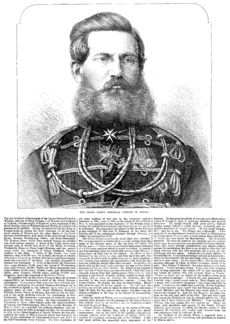
Four years later, Frederick fought in the Franco-Prussian War of 1870. He commanded the Third Army and was praised for his leadership. He won battles at Wissembourg and Wörth, and later at the Battle of Sedan and during the siege of Paris. He was promoted to field marshal.
Frederick was known for treating his enemies kindly. A journalist saw him visiting wounded soldiers and praised his actions. After one victory, Frederick told two French journalists, "I do not like war gentlemen. If I should reign I would never make it." Another journalist noted that Frederick showed "countless traits of kindness and humanity." For his actions, The Times newspaper praised him in 1871.
Crown Prince of the German Empire
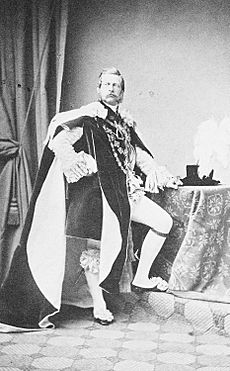
In 1871, after Prussia's victories, the German states united to form the German Empire. Frederick's father, William, became the Emperor, and Frederick became the heir. Bismarck, who was now the Chancellor, didn't like Frederick's liberal views.
Frederick often disagreed with his father and Bismarck. He sided with liberals who opposed expanding the army. He also worked on many public projects, like building schools and churches. He helped acquire many art collections for Berlin's new Kaiser Friedrich Museum. In 1878, when his father was injured, Frederick briefly took over his duties, but was soon pushed aside again.
Frederick and Victoria also stood up against people who were trying to harm German Jews. Victoria wrote that she was ashamed of her country because some people were "so hatefully towards people of a different faith." In 1880, Frederick and Victoria attended a synagogue service in Berlin to show their support for tolerance. Frederick gave a speech calling the anti-Jewish movement "a shameful blot on our time." He said he was ashamed of the "agitation against Jews" that was happening. In 1881, they went to another synagogue service and Frederick spoke out for "poor, ill-treated Jews" in Europe. Queen Victoria thanked him for his speech. However, many conservative Germans criticized Frederick for supporting the Jews. His oldest son, Wilhelm, even called his father weak and controlled by his British wife and the Jews.
Illness and Decline
Frederick had been a heavy smoker for many years. In early 1887, he became very hoarse. Doctors thought it was a throat infection. After some unsuccessful treatments, doctors diagnosed the growth in his throat as laryngeal cancer (throat cancer). They suggested a surgery to remove his larynx (voice box).
Frederick and his wife decided to get a second opinion from a British cancer specialist, Morell Mackenzie. Mackenzie did a biopsy (taking a small tissue sample) and sent it to a pathologist. The pathologist couldn't find any cancer cells. So, Mackenzie advised against the surgery, saying Frederick would recover in a few months. Bismarck also opposed a major operation.
Frederick traveled to London to see Mackenzie again. Mackenzie removed most of the growth. Frederick spent some time recovering. However, the growth reappeared, which was a bad sign that it was indeed cancerous.
Frederick's condition worsened. He lost his voice completely and felt severe pain. Doctors now agreed that it was cancer and that a total laryngectomy was needed to save his life. Frederick was heartbroken by the news. He decided against the risky surgery, but agreed to a tracheotomy (a hole in his windpipe) if he had trouble breathing.
The news caused anger in Berlin, with some blaming Victoria. Some even suggested Frederick should give up his place in line for the throne. But Bismarck insisted that Frederick would become emperor regardless of his health.
In early 1888, Frederick's hoarseness returned, and he developed a throat infection. He couldn't speak, had bad headaches, and couldn't sleep. On February 8, he had the tracheotomy. A tube was put in his throat to help him breathe. For the rest of his life, he couldn't speak and had to communicate by writing.
Even after the tracheotomy, Frederick continued to have fevers and headaches. Doctors confirmed that the cancer had spread.
Brief Reign and Death
Three days after his cancer was confirmed, his father, Emperor William I, died on March 9, 1888. Frederick became German Emperor and King of Prussia. His son, Wilhelm, sent him the news in Italy. Frederick wrote in his diary that he had "ascended the throne of my forefathers."
People who wanted progress in Germany hoped Frederick's reign would bring liberal changes. Frederick wanted to limit the chancellor's power, but his illness prevented him from doing much. He did manage to force a minister to resign when there was evidence of election interference. Dr. Mackenzie noted that the emperor felt a strong sense of duty. Empress Victoria wrote that Frederick was able to work, but not being able to speak was very difficult. Frederick had the desire to make changes but not enough time. He sadly said in May 1888, "I cannot die ... What would happen to Germany?"
By April 1888, Frederick was too weak to walk and mostly stayed in bed. The cancer spread, making it hard for him to eat. He suffered from vomiting and fevers. He wrote his last diary entry on June 11: "What's happening to me? I must get well again; I have so much to do!"
Frederick III died in Potsdam on June 15, 1888, at 11:30 a.m. His 29-year-old son, Wilhelm II, became the new emperor. Frederick III is buried in a special mausoleum next to the Friedenskirche church in Potsdam. After his death, a British politician called him the "Barbarossa of German liberalism." Empress Victoria continued to share Frederick's ideas, but she no longer had power in the government.
Legacy
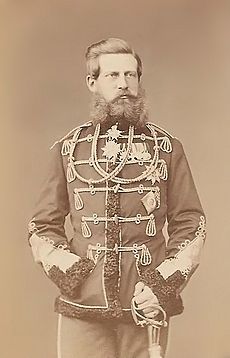
Frederick believed that a country's government should listen to its people. He had always been liberal and had discussed his plans with Victoria before he became emperor. He admired Prince Albert and the British parliamentary system. Frederick and Victoria planned to rule together and make Germany more liberal by appointing ministers who shared their views. They wanted to greatly reduce the power of the Chancellor and make Germany more like a liberal democracy.
Many historians believe that Frederick's early death stopped Germany from becoming more liberal. They think that if he had lived longer and been healthier, he might have prevented Germany from becoming so militaristic, which could have stopped World War I. Some historians even suggest that he might have prevented the rise of Adolf Hitler and World War II.
However, other historians disagree. They believe Frederick wouldn't have been able to change Germany's direction, even if he had lived longer. They point out that he was a soldier and deeply rooted in his family's military traditions. Some say he often followed his father's and Bismarck's policies earlier in his life. Others argue that Frederick was too weak to bring about real change. They also suggest that his liberal image might have been made stronger after his death, especially because of the mistakes made by his son, Wilhelm II.
Frederick's children, especially Wilhelm, had a big impact on Europe. Unlike his father, Wilhelm had not experienced the horrors of war. He loved his family's military heritage and was influenced by Bismarck. Bismarck, who disliked Frederick's and Victoria's liberal ways, tried to increase the tension between Wilhelm and his parents. Wilhelm grew up disagreeing with his parents' ideas about government. After his father's death, he said he would follow his grandfather's path, not his father's. Wilhelm II abandoned Frederick's policies and eventually led Germany into World War I.
Bismarck's plan to weaken Frederick and Victoria, and to use Wilhelm II to keep his own power, eventually led to Bismarck's own downfall. Wilhelm also believed the chancellor's position was too strong and should be changed to give the Emperor more power.
Churches named after Frederick include the Kaiser-Friedrich-Gedächtniskirche in Berlin. Mount Frederick William in Canada is also named in his honor.
Titles, Styles and Honours
Titles and Styles
- 18 October 1831 – 2 January 1861: His Royal Highness Prince Frederick William of Prussia
- 2 January 1861 – 18 January 1871: His Royal Highness The Crown Prince of Prussia
- 18 January 1871 – 9 March 1888: His Imperial and Royal Highness The German Crown Prince, Crown Prince of Prussia
- 9 March 1888 – 15 June 1888: His Imperial and Royal Majesty The German Emperor, King of Prussia
Honours
- German decorations
 Prussia:
Prussia:
- Knight of the Black Eagle, 18 October 1841; with Collar, 1849
- Grand Commander's Cross of the Royal House Order of Hohenzollern, 1851; with Star, 11 September 1869; with Swords, 1873
- Grand Cross of the Red Eagle, with Oak Leaves, 18 October 1861; with Swords, 1864
- Knight of the Royal Crown Order, 1st Class, 18 October 1861
- Pour le Mérite (military), 29 June 1866; with Oak Leaves, 3 August 1866; Grand Cross, 20 September 1866; with Oak Leaves, 2 September 1873
- Grand Cross of the Iron Cross, 22 March 1871
- Service Award Cross
 Hohenzollern: Cross of Honour of the Princely House Order of Hohenzollern, 1st Class with Swords
Hohenzollern: Cross of Honour of the Princely House Order of Hohenzollern, 1st Class with Swords Ascanian duchies: Grand Cross of the Order of Albert the Bear, 14 February 1853; with Swords, 12 September 1864
Ascanian duchies: Grand Cross of the Order of Albert the Bear, 14 February 1853; with Swords, 12 September 1864 Baden:
Baden:
- Knight of the House Order of Fidelity, 1850
- Grand Cross of the Zähringer Lion, 1850
- Grand Cross of the Military Karl-Friedrich Merit Order, 1867
 Bavaria:
Bavaria:
- Knight of St. Hubert, 1853
- Grand Cross of the Military Order of Max Joseph, 28 August 1870
 Brunswick: Grand Cross of the Order of Henry the Lion
Brunswick: Grand Cross of the Order of Henry the Lion

 Ernestine duchies: Grand Cross of the Saxe-Ernestine House Order, November 1854
Ernestine duchies: Grand Cross of the Saxe-Ernestine House Order, November 1854 Hanover:
Hanover:
- Knight of St. George, 1858
- Grand Cross of the Royal Guelphic Order, 1858
 Hesse-Kassel: Knight of the Golden Lion, 16 April 1853
Hesse-Kassel: Knight of the Golden Lion, 16 April 1853 Hesse-Darmstadt:
Hesse-Darmstadt:
- Grand Cross of the Ludwig Order, 11 October 1855
- Military Merit Cross for 1870/71, 15 March 1871
 Mecklenburg:
Mecklenburg:
- Grand Cross of the Wendish Crown, with Crown in Ore
- Military Merit Cross, 1st Class (Schwerin)
- Cross for Distinction in War (Strelitz)
 Nassau: Knight of the Gold Lion of Nassau, March 1861
Nassau: Knight of the Gold Lion of Nassau, March 1861 Oldenburg: Grand Cross of the Order of Duke Peter Friedrich Ludwig, with Golden Crown, 17 April 1859; with Swords, 31 December 1870
Oldenburg: Grand Cross of the Order of Duke Peter Friedrich Ludwig, with Golden Crown, 17 April 1859; with Swords, 31 December 1870 Saxe-Weimar-Eisenach: Grand Cross of the White Falcon, 15 December 1848; with Swords, 1870
Saxe-Weimar-Eisenach: Grand Cross of the White Falcon, 15 December 1848; with Swords, 1870 Saxony:
Saxony:
- Knight of the Rue Crown, 1857
- Grand Cross of the Military Order of St. Henry, 1870
 Schaumburg-Lippe: Military Merit Medal
Schaumburg-Lippe: Military Merit Medal Württemberg:
Württemberg:
- Grand Cross of the Württemberg Crown, 1867
- Grand Cross of the Military Merit Order, 23 October 1870
- Foreign decorations
 Austria:
Austria:
- Grand Cross of the Royal Hungarian Order of St. Stephen, 1852
- Knight of the Military Order of Maria Theresa, 1864
- Service Medal for Officers (25 years)
 Belgium: Grand Cordon of the Order of Leopold, 6 May 1853
Belgium: Grand Cordon of the Order of Leopold, 6 May 1853 Brazil: Grand Cross of the Southern Cross
Brazil: Grand Cross of the Southern Cross Denmark: Knight of the Elephant, 19 August 1873
Denmark: Knight of the Elephant, 19 August 1873 France: Grand Cross of the Legion of Honour, December 1856
France: Grand Cross of the Legion of Honour, December 1856 Greece: Grand Cross of the Redeemer
Greece: Grand Cross of the Redeemer Hawaii: Grand Cross of the Order of Kamehameha I
Hawaii: Grand Cross of the Order of Kamehameha I Japan: Grand Cordon of the Order of the Chrysanthemum, 20 May 1880
Japan: Grand Cordon of the Order of the Chrysanthemum, 20 May 1880 Mexico: Grand Cross of the Imperial Order of Guadalupe
Mexico: Grand Cross of the Imperial Order of Guadalupe Netherlands:
Netherlands:
- Grand Cross of the Military William Order, 23 August 1878
- Grand Cross of the Netherlands Lion
 Ottoman Empire:
Ottoman Empire:
- Order of Distinction, in Diamonds
- Order of Osmanieh, 1st Class
- Gold Imtiyaz Medal
 Tunisia: Husainid Family Order
Tunisia: Husainid Family Order Persia: Order of the August Portrait, in Diamonds
Persia: Order of the August Portrait, in Diamonds Portugal:
Portugal:
- Grand Cross of the Sash of the Two Orders
- Grand Cross of the Tower and Sword, with Swords
 Qing dynasty: Order of the Double Dragon, Class I Grade I
Qing dynasty: Order of the Double Dragon, Class I Grade I Romania: Grand Cross of the Star of Romania, with Swords
Romania: Grand Cross of the Star of Romania, with Swords Russia:
Russia:
- Knight of St. Andrew, September 1843
- Knight of St. Alexander Nevsky, September 1843
- Knight of the White Eagle, September 1843
- Knight of St. Anna, 1st Class, September 1843
- Knight of St. Stanislaus, 1st Class, September 1843
- Knight of St. George, 4th Class, 1869; 2nd Class, 1870
 San Marino: Commander of the Order of San Marino
San Marino: Commander of the Order of San Marino Sardinia:
Sardinia:
- Knight of the Annunciation, 11 June 1850
- Grand Cross of the Military Order of Savoy
- Gold Medal of Military Valour, 3 July 1866
 Holy See: Grand Cross of the Holy Sepulchre of Jerusalem
Holy See: Grand Cross of the Holy Sepulchre of Jerusalem Serbia:
Serbia:
- Grand Cross of the Cross of Takovo
- Grand Cross of the White Eagle
 Siam: Grand Cross of the White Elephant
Siam: Grand Cross of the White Elephant Spain:
Spain:
- Knight of the Golden Fleece, 29 January 1862
- Grand Cross of the Military Order of St. Ferdinand

 Sweden-Norway:
Sweden-Norway:
- Knight of the Order of Charles XIII, 3 May 1858
- Knight of the Seraphim, 8 January 1861
- Grand Cross of St. Olav, 5 August 1873
 Two Sicilies: Grand Cross of St. Ferdinand and Merit
Two Sicilies: Grand Cross of St. Ferdinand and Merit United Kingdom:
United Kingdom:
- Stranger Knight of the Garter, 28 January 1858
- Honorary Grand Cross of the Bath (military), 25 January 1883
 Venezuela: Collar of the Order of the Liberator
Venezuela: Collar of the Order of the Liberator
Issue
| Image | Name | Birth | Death | Notes |
|---|---|---|---|---|
 |
Wilhelm II, German Emperor | 27 January 1859 | 4 June 1941 | married (1), 27 February 1881, Princess Auguste Viktoria of Schleswig-Holstein; died 1921; had issue (2), 9 November 1922, Princess Hermine Reuss of Greiz, no issue |
 |
Charlotte, Duchess of Saxe-Meiningen | 24 July 1860 | 1 October 1919 | married, 18 February 1878, Bernhard III, Duke of Saxe-Meiningen; had issue |
 |
Prince Henry of Prussia | 14 August 1862 | 20 April 1929 | married, 24 May 1888, his first cousin Princess Irene of Hesse and by Rhine; had issue |
 |
Prince Sigismund of Prussia | 15 September 1864 | 18 June 1866 | died of meningitis at 21 months. First grandchild of Queen Victoria to die. |
 |
Viktoria, Princess Adolf of Schaumburg-Lippe | 12 April 1866 | 13 November 1929 | married (1), 19 November 1890, Prince Adolf of Schaumburg-Lippe; he died 1916; no issue (2), 19 November 1927, Alexander Zoubkov; no issue |
 |
Prince Waldemar of Prussia | 10 February 1868 | 27 March 1879 | died of diphtheria at age 11 |
 |
Sophia, Queen of the Hellenes | 14 June 1870 | 13 January 1932 | married, 27 October 1889, Constantine I, King of the Hellenes; had issue |
 |
Margaret, Landgravine of Hesse-Kassel, Queen of Finland | 22 April 1872 | 22 January 1954 | married, 25 January 1893, Prince Frederick Charles of Hesse, king-elect of Finland, later Landgrave of Hesse-Kassel; had issue |
See also
 In Spanish: Federico III de Alemania para niños
In Spanish: Federico III de Alemania para niños
- "A Legend of Old Egypt"—an 1888 short story by Bolesław Prus, inspired by Frederick III's tragic premature death.
 | James Van Der Zee |
 | Alma Thomas |
 | Ellis Wilson |
 | Margaret Taylor-Burroughs |


